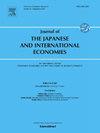Short-run and long-run consequences of unconventional monetary policy in Japan
IF 3.1
3区 经济学
Q1 ECONOMICS
Journal of the Japanese and International Economies
Pub Date : 2025-05-23
DOI:10.1016/j.jjie.2025.101375
引用次数: 0
Abstract
Monetary policy is a powerful policy tool in stabilizing short-term economic fluctuations. However, no matter how effective it is, it could have unintended adverse impacts on the economy if the central bank continued extreme monetary easing over a long period of time. Japan is an exceptional country where such concern exists. This paper analyzes the effects of unconventional monetary policy in Japan since the end of the 1990s. We explore the effects not only on stabilizing short-term macroeconomic fluctuations such as the GDP gap, but also on medium- and long-term productivity such as total factor productivity (TFP). If the prolonged ultra-low interest rate environment distorts the price mechanism and causes misallocation of funds, the unconventional monetary policy could reduce the productivity of the economy. The estimation results show that the Bank of Japan (BOJ)'s unconventional monetary policy had a significant positive impact on the GDP gap even under a liquidity trap where the policy rate hit its effective lower bound (ELB). However, they also show that unconventional monetary policy had a significant negative impact on TFP growth. The results suggest that while unconventional monetary policy was effective in boosting the economy in the short term, the prolonged ultra-low interest rate environment may have had a negative impact on medium- and long-term productivity growth in the Japanese economy.
日本非常规货币政策的短期和长期后果
货币政策是稳定短期经济波动的有力政策工具。然而,无论多么有效,如果央行长期持续极端货币宽松,可能会对经济产生意想不到的不利影响。日本是存在这种担忧的例外国家。本文分析了20世纪90年代末以来日本非常规货币政策的效果。我们不仅探讨了对稳定GDP差距等短期宏观经济波动的影响,还探讨了对中长期生产率(如全要素生产率(TFP))的影响。如果长期的超低利率环境扭曲了价格机制,导致资金配置不当,非常规货币政策可能会降低经济生产率。估计结果表明,即使在政策利率达到有效下限的流动性陷阱下,日本央行的非常规货币政策对GDP缺口也有显著的积极影响。然而,它们也表明非常规货币政策对全要素生产率增长有显著的负面影响。研究结果表明,尽管非常规货币政策在短期内有效提振了日本经济,但长期的超低利率环境可能对日本经济的中长期生产率增长产生了负面影响。
本文章由计算机程序翻译,如有差异,请以英文原文为准。
求助全文
约1分钟内获得全文
求助全文
来源期刊
CiteScore
5.10
自引率
6.90%
发文量
36
期刊介绍:
The Journal of the Japanese and International Economies publishes original reports of research devoted to academic analyses of the Japanese economy and its interdependence on other national economies. The Journal also features articles that present related theoretical, empirical, and comparative analyses with their policy implications. Book reviews are also published.

 求助内容:
求助内容: 应助结果提醒方式:
应助结果提醒方式:


